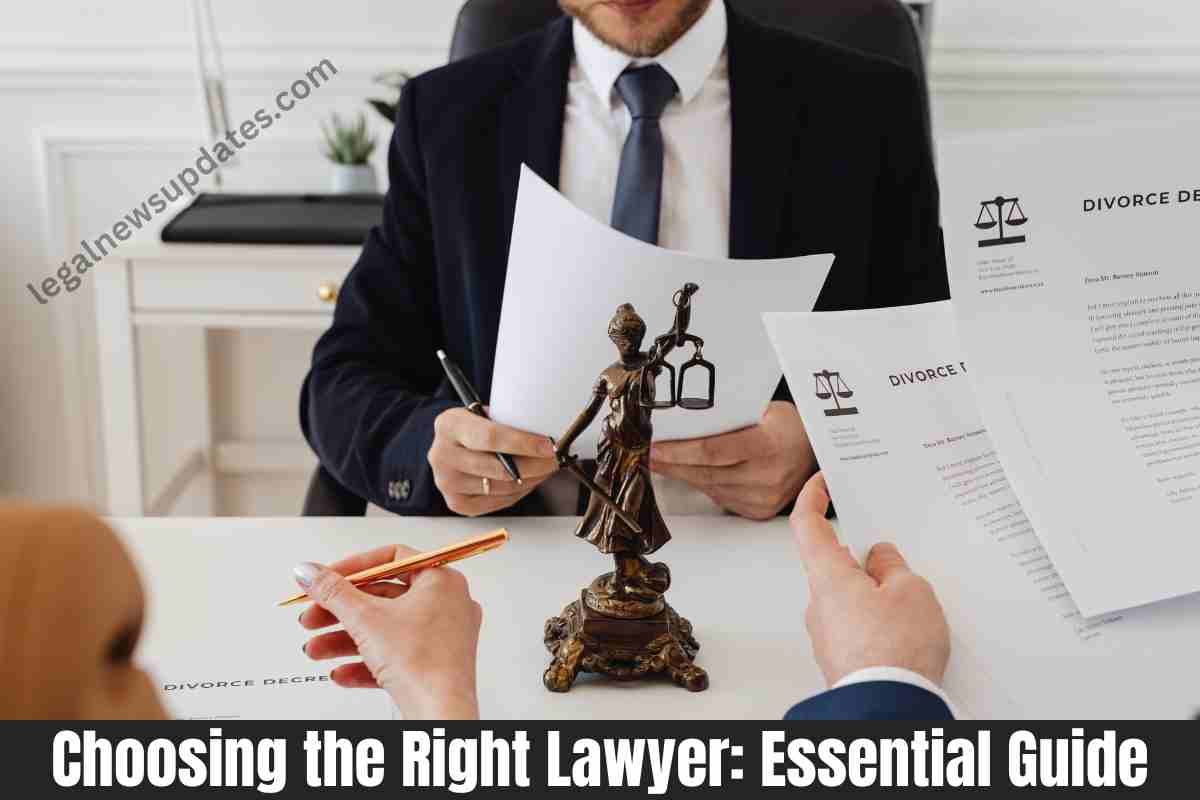Choosing the Right Lawyer: Essential Guide

Choosing the right lawyer for your case is a pivotal decision that can significantly influence the outcome of your legal issues. Whether you’re dealing with a personal injury claim, facing criminal charges, or navigating a divorce, the Expertise and diligence of your lawyer are critical to protecting your rights and interests. This blog post will guide you through selecting a lawyer well-suited to your legal needs. We’ll explore the various types of lawyers, key factors to consider in your selection, how to research and find potential lawyers, what questions to ask during initial consultations, and ultimately, how to make an informed decision. With the right approach, you can find a legal advocate who understands your case’s nuances and aligns with your expectations and budget.
Understanding Different Types of Lawyers
The field of law is vast, with legal professionals specializing in specific areas to provide the most effective representation. Understanding these distinctions is the first step in selecting the right lawyer for your case.
Family Law: Family lawyers handle cases related to divorce, child custody, adoption, and other matters affecting family relationships.
Criminal Law: If you’re accused of a crime, a criminal defense lawyer is your ally, defending your rights and working to achieve the best possible outcome.
Corporate Law: For business-related issues, including incorporation, mergers, and contracts, a corporate lawyer is essential.
Personal Injury Law: These lawyers represent individuals seeking compensation for injuries caused by others’ negligence, such as in car accidents or medical malpractice cases.
Estate Planning: Estate lawyers assist with wills, trusts, and planning for managing an individual’s estate after death.
Selecting a lawyer specializing in the relevant area of law ensures you have an up-to-date expert with the latest legal developments and precedents in your specific issue.
Factors to Consider When Choosing a Lawyer: Choosing the Right Lawyer: Essential Guide
Experience and Expertise
The experience and expertise of a lawyer in your specific type of case are paramount. A lawyer with a proven track record in a particular field brings a wealth of knowledge and a strategic advantage, having navigated the complexities of similar cases before. It’s crucial to understand how their experience aligns with your needs.
Assessing Experience: Ask potential lawyers about their experience in cases like yours. Inquire about the outcomes of those cases and if they have specific training or certification in the relevant area of law.
Expertise Matters: Specialization is critical in the legal field. A lawyer specializing in your type of case will likely be more up-to-date on the applicable laws and precedents, which can significantly affect the outcome.
Reputation
A lawyer’s reputation among peers, former clients, and within the legal community can offer valuable insights into their professionalism and effectiveness. A reputable lawyer can command respect in negotiations and courtrooms, potentially tilting the scales in your favor.
Researching Reputation: Online reviews, state bar association records, and peer reviews can be informative. Additionally, ask the lawyer for references from past clients or other attorneys.
Significance of Reputation: A lawyer’s reputation for diligence, ethical practice, and success not only speaks to their capability but can also influence dealings with court personnel, judges, and opposition attorneys.
Communication and Compatibility
Effective communication and personal Compatibility with your lawyer are crucial for a successful legal partnership. It would help if you had someone who listens, understands your concerns, and communicates clearly and timely.
Communication Style: Does the lawyer explain legal concepts in a way you understand? Are they accessible via phone or email? Their communication style should match your preferences.
Assessing Compatibility: It’s essential that you feel comfortable with your lawyer. Trust your instincts about whether you can work closely with this person over a potentially lengthy and stressful period.
Fees and Billing Practices: Choosing the Right Lawyer
Understanding how lawyers charge and what you can expect regarding fees is essential to avoid surprises and ensure the arrangement fits your budget.
Billing Methods: Lawyers may bill by the hour, offer flat fees for specific services, or work on a contingency basis (where they receive a percentage of the settlement or award). Discuss the billing method upfront and ensure you understand what services are included.
Discussing Fees: Don’t hesitate to ask about fees during your initial consultation. A transparent conversation about costs ensures both parties have clear expectations.
How to Research and Find Lawyers
Finding the right lawyer requires knowing where to look and what criteria to use in your search. The following avenues can help you compile a list of potential candidates:
Online Directories and Lawyer Referral Services: Websites like Martindale-Hubbell, Avvo, and the American Bar Association offer directories and referral services to help you find lawyers by specialty and location. These platforms often include reviews and ratings.
Leveraging Your Network: Ask friends, family, or professionals (such as your accountant or business advisor) for recommendations. Personal referrals can provide insights into a lawyer’s demeanor, effectiveness, and client service.
Initial Consultations: Many lawyers offer free or low-cost initial consultations. Use these meetings to gauge the lawyer’s Expertise, communication style, and whether they fit your case well.
Questions to Ask During the Initial Consultation
The initial consultation allows you to evaluate the lawyer’s suitability for your case. Prepare a list of questions to ask, including:
- How much experience do you have with cases like mine?
- What is your approach or strategy for my case?
- Can you provide references from past clients?
- How will you communicate updates and developments to me?
- What are your fees, and how are they structured?
Making the Final Decision
After meeting with potential lawyers and considering their experience, Expertise, reputation, communication style, and fees, it’s time to choose. Weigh the pros and cons of each candidate, considering which lawyer you feel most confident and comfortable working with. Trusting your instincts is crucial; if something feels off, it may be worth continuing your search. Remember, the right lawyer for your case is one who not only has the requisite skills and experience but also aligns with your communication preferences and legal philosophy.
This comprehensive exploration should equip you with the knowledge and strategies to choose the right lawyer for your case. Remember, the decision is about qualifications and finding a legal partner who respects your views, communicates effectively, and is committed to achieving the best possible outcome for your situation.
With all sections outlined and the first two parts completed, I will proceed to draft the detailed sections on “Experience and Expertise,” “Reputation,” “Communication and Compatibility,” and “Fees and Billing Practices” in the following response, ensuring a thorough understanding and actionable insights for readers. Let me know if there are any specific areas you’d like to emphasize or if you have any additional requests.
Conclusion: Choosing the Right Lawyer
In conclusion, selecting the right lawyer is a pivotal decision with profound implications for your legal journey. It demands a careful balance of expertise, communication, and trust. Focus on finding a lawyer with specific experience in your type of case, a commendable reputation, and a communication style that resonates with you. Discuss fees and billing practices upfront to avoid surprises. Utilize consultations to gauge compatibility and ensure your potential lawyer aligns with your expectations and legal objectives. Trusting your instincts after thorough research and thoughtful consideration will guide you to the best choice. This choice is not just about legal expertise; it’s about finding an advocate who understands your goals and stands by your side. With the right lawyer, you navigate the legal system more confidently, increasing the likelihood of a favorable outcome.










1 thought on “Choosing the Right Lawyer: Essential Guide”